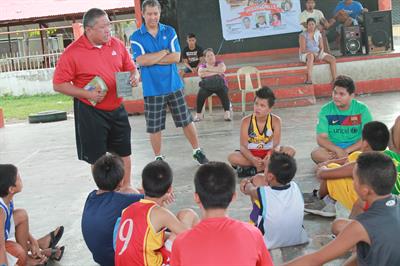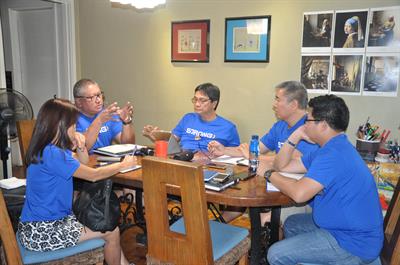You might think that a story about how FCA officially launched its ministry in the Philippines would start somewhere in Southeast Asia with a well-developed game plan. Instead, you would need to take a trip back to the 2008 Final Four in the unlikeliest of locations, Detroit, Michigan, where a seemingly happenstance encounter turned out to be divinely orchestrated.
It all happened at the annual National Association of Basketball Coaches (NABC) conference. Filipino coach and sports minister Gary Visitacion was roaming the convention floor where hundreds of vendors were pitching their wares. Dan Britton was manning an FCA booth.
“Dan caught my eye and started talking to me,” Gary recalled. “He segued right away into sharing the Gospel. I let him continue, because I was trying to observe him.”
After a few minutes, Gary felt guilty for his covert charade and leaned over the table.
“Excuse me,” he said. “I’m a believer. I just wanted to see if you were the real deal.”
“Why didn’t you stop me?” Dan emphatically exclaimed.
The two shared a hearty laugh and became instant friends. Before exchanging information with Gary, he explained to Dan that he had never heard of FCA, but he had spent the last several years working with Sports Ambassadors, a ministry that sends basketball teams around the world every summer to share the Gospel.
“Gary was captivated by our ministry model,” Dan said. “He wanted to know more about Camps and Huddles and our approach to ministering to coaches and athletes.”
FCA was already looking into some ministry opportunities in the Philippines but nothing had been solidified. Perhaps Gary was the missing piece for which they had been searching, Dan wondered.
That led to a meeting with then FCA International Director Barry Spofford at a conference in Orlando the following week. Barry asked Gary if he would be interested in helping FCA establish ministry in the Philippines. After conferring with the Sports Ambassadors leadership, Gary agreed to partner with FCA during the 10 months of the year when he wasn’t committed to facilitating ministry through the other organization.
But his involvement with FCA quickly escalated.

“The work was getting bigger and bigger and the vision was to put FCA chapters all over the country, which meant I would need to travel all over the country,” Gary said. “It wasn’t fair to be doing two things at the same time.”
Barry and Dan agreed. Although it had only been a year, the time had come for Gary to go full time with FCA. The rest has been history—quite literally as far as Dan is concerned.
“The ministry has exploded,” he expounded. “He’s been the catalyst. Gary has been a visionary doer. He casts vision. He has a big dream. He gets stuff done. As a result of that, we’ve seen ministry rapidly grow through his leadership.”
Getting started wasn’t easy. First, Gary had to take a long, hard look at the unique nature of his home country. The Philippines is composed of 7,641 densely populated islands. Travel can be expensive and time consuming. The best way to tackle the enormous challenge was build a core team around him and then begin establishing ministry across the nation’s 146 cities, one at a time.
“It was difficult at first,” Gary admitted. “Logistics are very important in raising funds, but we focused on those areas where I had connections.”
Some of the first leaders to come aboard included Assistant National Director Jojo Villa and his wife Janet, and Regional Director Tata Merced. As the team took shape, Gary and Dan devised a new strategy that divided the Philippines into six regions and assigned full-time staff in key cities.
Coach Tata, for instance, was charged with the task of seeking out ministry within 16 cities within his region. Coach Jojo, on the other hand, was given 19 cities to develop.
“It makes my job easier to just deal with the regional leaders and some specialized leaders throughout the Philippines,” Gary said. “Delegating is biblical. It’s given me more energy and more focus.”
 Eleven years since Gary’s introduction to FCA, ministry has been established in 21 cities, each with its own area director. There are a combined 40 FCA staff (mostly volunteers) working throughout the Philippines.
Eleven years since Gary’s introduction to FCA, ministry has been established in 21 cities, each with its own area director. There are a combined 40 FCA staff (mostly volunteers) working throughout the Philippines.
“The Lord is opening doors for us,” Gary said. “He has been so gracious. He has given us the best leaders that we needed.”
Ministry in the Philippines has also been buoyed by support from the Rockies Region in the U.S. For the past six years, Mike Sanfratello, Vice President of Field Ministry, has marveled at Gary and his team’s strident growth.
“It’s very clear who the leader in the Philippines is, and that’s Gary Visitacion,” Mike said. “The team responds well to him. He’s a good team builder. He’s a good networker. He’s a good leader.”
Aaron Frude, Rockies Regional International Coordinator for the South Pacific, concurs with Mike’s assessment. Both leaders (along with other FCA team members) have regularly traveled to the Philippines for an annual summit that brings the nation’s staff and volunteers together for training and fellowship. In that up-close-and-personal environment, they have been able to clearly see why the ministry has thrived.
“The growth in the Philippines through Gary’s leadership has been pretty incredible,” Aaron said. “Administratively he’s organized in a way that helps him to serve the team. Part of his strength is the fact that he’s a pastor at heart. He goes by Pastor Gary. He cares about his volunteers. He helps them as ministry partner, but more importantly, as people. He shepherds them well.”
Another key component has been access to FCA resources, which help Gary and his team train and disciple coaches and athletes more effectively. Even before these materials were flowing freely throughout the Philippines, Gary was able to see the power they had when he met a basketball coach who was struggling to connect his faith to his profession.
The coach somehow stumbled across a copy of the FCA book, Excellence, at a used bookstore in a mall.
“He read the book, and it was like the light came on,” Gary said. “This is what he needed. He opened up the back page and found the address for FCA and emailed right away. Dan forwarded the email to me.”
The coach flew to a city where Gary was giving a presentation. The two met for two days. On the third day, the coach agreed to help start FCA in his city.
“This is what he was looking for,” Gary said. “He wanted to know how he could be a part of it.”
Many of the FCA Philippines staff and volunteers are coaches, teachers and former athletes. Because of their collective influence and the Filipino’s love of competitive sports, it’s been relatively easy to organize community events—mostly basketball in a nation that has been in love with the sport since Christian ministries like Sports Ambassadors first introduced it into the culture during the mid-1950s.
According to Gary, the vast majority of Filipino youth participate in sports at some level. Basketball hoops on most every street corner provide physical evidence of his claim.
“That’s their hallmark,” Mike Sanfratello said. “It’s a lot of camps and clinics and leagues that draw kids into a place where they’re experiencing the Gospel and learning more about Jesus.”
That’s something that Gary never could have imagined while walking the convention floor in Detroit at the 2008 Final Four.
“It’s been a long journey with FCA already, but it’s been exciting and fun,” he said. “I’m the type of leader who loves to build and then delegate and empower others to take over. That’s how the Lord wired me as a leader.”
And as Aaron Frude can attest, Gary Visitacion has become a living testament to FCA’s ministry methods: “Engage, Equip, Empower.”
“He engages coaches and athletes. He gets to know them,” Aaron explained. “He equips them with some structure and with the resources of FCA. And he empowers them. They’re held accountable. They’re able to grow throughout the Philippines and connect in key cities. That model has been a game changer for the longevity of FCA’s ministry and the sustained growth throughout the Philippines.”
Five Facts About The Philippines
1. More than 100 million people live in the Philippines, making it the eighth most populace country in Asia and the 12th most populace country in the world.
2. There are 19 recognized languages in the Philippines including the two most widely used: Filipino and English.
3. Roughly 90 percent of the Filipino population is Christian including 80 percent Catholic and 10 percent Protestant. The remaining 10 percent is divided between several religious groups including Hindus, Jews, and Baha’is.
4. The Philippines has produced several well-known entertainers including Apl.de.ap (The Black Eyed Peas), Arnel Pineda (Journey), Jerome Fontamillas (Switchfoot), singer/actress Lea Salonga, and Pia Wurtzbach (Miss Universe). Some well-known Filipino-Americans include Grammy Award winning music artist Bruno Mars, actor Darren Criss, and actresses Vanessa Hudgens and Hailee Steinfield.
5. Basketball is by far the most popular sport in the Philippines, but other sports such as boxing, volleyball, soccer, badminton, and American football are becoming increasingly popular as well. The most famous Filipino is world champion boxer and politician Manny Pacquiao.